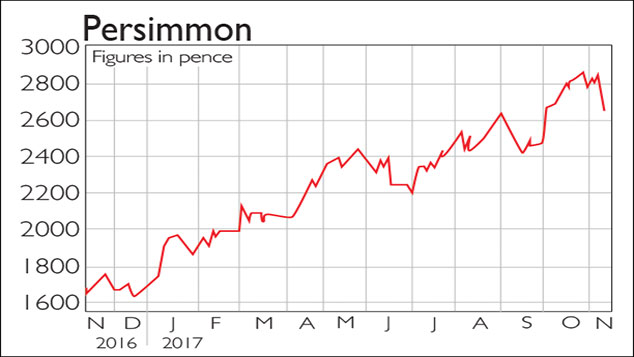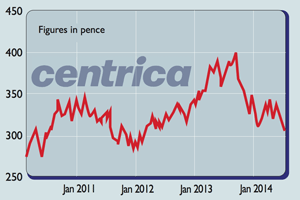Is it time to buy Centrica for its huge dividend?
Shares in Centrica, owner of British Gas, come with a dividend yield of 8% after the share price fell dramatically last week. So should you buy in?

Get the latest financial news, insights and expert analysis from our award-winning MoneyWeek team, to help you understand what really matters when it comes to your finances.
You are now subscribed
Your newsletter sign-up was successful
Want to add more newsletters?

Twice daily
MoneyWeek
Get the latest financial news, insights and expert analysis from our award-winning MoneyWeek team, to help you understand what really matters when it comes to your finances.

Four times a week
Look After My Bills
Sign up to our free money-saving newsletter, filled with the latest news and expert advice to help you find the best tips and deals for managing your bills. Start saving today!

British Gas owner Centrica issued a major profit warning towards the end of last week.
The share price fell hard and it hasn't rebounded as yet. The "boring" utility company now pays a dividend yield of more than 8%.
Now I know our readers well, and I know that there's one obvious question that springs to your minds when you see a dirty great dividend yield like that.
MoneyWeek
Subscribe to MoneyWeek today and get your first six magazine issues absolutely FREE

Sign up to Money Morning
Don't miss the latest investment and personal finances news, market analysis, plus money-saving tips with our free twice-daily newsletter
Don't miss the latest investment and personal finances news, market analysis, plus money-saving tips with our free twice-daily newsletter
"Should I buy now or later?"...
Centrica sees a record fall in its share price
The British Gas owner has already had a pretty poor year. Sentiment towards the sector has not been helped by the fact that the utility sector in the UK is caught between the deep blue sea of Theresa May (who promises to cap energy prices) and the devil of Jeremy Corbyn (who promises to nationalise everything).
And certainly, in the UK, things are not looking great. The company lost 823,000 customers in the quarter to the end of October. That was driven partly by a decision to raise electricity prices by a staggering 12.5% at the end of September.
However, as Lex in the FT points out, the problems are not in fact, on the UK side. The loss of more than 800,000 customers might sound like a lot, and it was certainly more than many analysts had expected. But, according to Lex at least, these are relatively unprofitable customers who the company might be better off without.
The chief executive, Iain Conn, also argued that cost cuts meant that the earnings of the UK domestic business would stay pretty much the same as last year.
The real issue is across the Atlantic, in the North American side of the business.
Centrica also supplies power to businesses in the US and Canada. Unfortunately for Centrica, competitive pressure is growing over there, which has "put significant downward pressure" on profit margins. As a result, earnings per share are set to come in at 12.5p compared to market hopes for more than 15p a big write-down in other words.
Centrica is not a "buy"
So technically, that 8%-plus yield is "safe" for now.
So what should you do?
Here's my short answer: I don't think Centrica is a "buy" right now. Here's why.
Firstly, when things are going pear-shaped, I like to get a feeling that management knows what it's going do about it. Instead, there's a sense of "fingers crossed" here.
The regulatory regime in the UK could well get worse before it gets better. As we've noted above, the current Conservative government is about as good as it can get for the energy companies. I struggle to see the political mood music changing to make life easier.
The big energy companies might want to shift more of their profits to the servicing side of things. But as most of us know by now, making a decent profit from after-sales services is all about good customer service. And if there's one thing that the big utilities are not well-known for, it's good customer service.
It's very hard to take a business that has grown bloated on customer apathy and lack of competition and then turn it into a sales and customer-service orientated business. Just look at the banks. You can't take a business culture that couldn't care less about its customers and turn it into a "client-centred" business overnight, if ever.
(This is an interesting point to note actually. Businesses are generally run for the benefit of one specific set of stakeholders. Knowing who those stakeholders are can help you to make a decision about whether a company is worth investing in or not that's a topic for another day).
Secondly, competition is only going to get worse in the likes of the US. The utility market is already being "disrupted" there. Renewables, smart cities, localised grids this is not going to go away. If the company doesn't have a plan for dealing with it, then you've got big problems.
Thirdly, the other point I'd make about high dividend yields specifically is this: managements generally don't like cutting dividend payouts, particularly when big fund managers are relying on them. This is one reason why Shell and BP tend to do just about anything to avoid slashing their dividends. It's a pretty good way to find yourself on the fast track to the exit door.
However, there's a point at which a rocketing dividend yield acts as a signal to management. In this sort of environment, a yield of 8%-plus (which is what Centrica is offering now, assuming the dividend remains static) screams: "We don't believe you."
In a way, it gives management permission to cut the dividend to a more sustainable level. But of course, such dividend cuts often accompany rolling heads at the top.
So, in a nutshell: I don't think now is a good time to buy Centrica. There is little visibility on how the company plans to get out of this hole, and there will be building pressure behind the scenes on management to step up or step down. But even then, it's hard to see change at the top being capable of addressing the issues that the company faces.
A dividend cut and management reshuffle might be a "buy" signal, or at least a sign to re-evaluate the stock. But otherwise, I'd expect this profit warning to be followed up by another at some point in the next year.
Get the latest financial news, insights and expert analysis from our award-winning MoneyWeek team, to help you understand what really matters when it comes to your finances.

-
 How a ‘great view’ from your home can boost its value by 35%
How a ‘great view’ from your home can boost its value by 35%A house that comes with a picturesque backdrop could add tens of thousands of pounds to its asking price – but how does each region compare?
-
 What is a care fees annuity and how much does it cost?
What is a care fees annuity and how much does it cost?How we will be cared for in our later years – and how much we are willing to pay for it – are conversations best had as early as possible. One option to cover the cost is a care fees annuity. We look at the pros and cons.
-
 Despite surging profits investors should avoid Centrica shares
Despite surging profits investors should avoid Centrica sharesTips Profits in the energy sector are booming but Centrica shares are struggling. Rupert Hargreaves explains why he’d avoid the stock.
-
Centrica: the only way is up
News Centrica's share price has fallen by nearly 90% over the past few years. New finance director Chris O’Shea will hope to reverse that.
-
 Will Centrica slash dividends?
Will Centrica slash dividends?Features Finances are tight and payouts are under threat. The gas supplier’s new boss faces some tricky decisions, says Alice Gråhns.
-
 If you’d invested in: Persimmon and Centrica
If you’d invested in: Persimmon and CentricaFeatures Persimmon is the UK’s second-largest housebuilder. In November, it said the total sales rate per site for the third quarter was in line with the same period last year.
-
 Shares in focus: Centrica’s comeback trail
Shares in focus: Centrica’s comeback trailFeatures Utility company Centrica has had a rough ride. But with the shares offering a decent dividend yield, should you still buy in? Phil Oakley investigates.
-
Company in the news: Centrica
Features The last few months have beeen a trying time for the energy utility, says Phil Oakley.
-
Sector in the news: The energy companies
Features Public anger has been directed at energy companies in recent days, says Phil Oakley. Yet, these two providers could be worth buying for the long term.